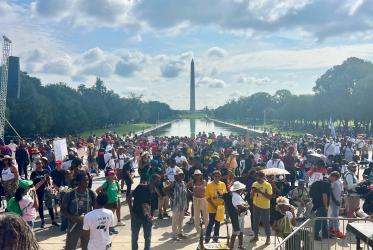The World Council of Churches (WCC) believes that the situation on the Korean peninsula fully warrants the serious and sustained attention of the international community. There is no other geographic context in which the risk of regionally and globally catastrophic conflict is greater, and no point in recent history when tensions in the region have been higher. It is of critical and urgent necessity that the risks of conflict be reduced, not heightened.
For more than 30 years the WCC has been engaged in facilitating and accompanying dialogue and encounter between Christians from both North and South Korea. We have repeatedly and consistently opposed and challenged rhetoric and actions that increase tensions and escalate the risks of armed – and potentially nuclear – conflict. Repeatedly and consistently the WCC and its member churches have called for measures to reduce tensions, to build confidence, and to promote dialogue for peaceful coexistence among the divided people of the Korean peninsula.
In this regard, WCC must express its very grave concern and alarm at the escalating rhetoric and accelerating cycle of threat and counter-threat between antagonists in this situation. The latest statements by the President of the United States of America adopt a tone almost indistinguishable from the threats emanating from North Korea. While no doubt intended to project strength and resolve, they risk taking the world yet closer to the precipice of conflict.
The fresh sanctions against North Korea recently adopted by the UN Security Council are also likely to have this counterproductive effect. The North Korean sanctions regime, already the most stringent ever developed, has not demonstrated any positive impact in its stated purpose of promoting a return to negotiations; neither has it prevented North Korea’s development of nuclear weapon and inter-continental ballistic missile capabilities. But it has, despite relevant exceptions in the sanctions regime, clearly contributed to impeding humanitarian access to North Korea for disaster relief and other humanitarian purposes, as members of the WCC-convened Ecumenical Forum for Korea (EFK) can attest. And it has certainly contributed to escalating tensions in the region, and to obstructing new dialogue initiatives. It is not at all clear how the new sanctions can be expected to make any more positive contribution to this extremely delicate and dangerous situation.
The international community must work to create a context in which dialogue can occur. There needs to be a serious reconsideration of the failed and counterproductive policy of pressure and sanctions. If the international community truly seeks negotiations for peace on the Korean peninsula, then it must work to deconstruct the barriers to dialogue and engagement which sanctions have become. We urge the international community rather to adopt measures which can contribute to creating the necessary context for dialogue and a constructive defusing of tensions on the Korean peninsula.
The WCC strongly supports the elimination of nuclear weapons, not only from the Korean peninsula, but everywhere around the world. In the current context of the Korean peninsula, we call for the North Korean government to cease its testing and development of nuclear weapons, and for the governments of South Korea and the USA to desist from seeking to deploy nuclear arsenals in the region. We urge ALL states to ratify and implement the new Treaty on the Prohibition of Nuclear Weapons, to remove this awful threat to life on earth. Today marks the 72nd anniversary of the atomic bombing of Nagasaki, which we pray will forever remain the last city to be destroyed by nuclear weapons.
We call for a sea-change in the international community’s approach to North Korea, in favour of dialogue and engagement rather than military and political confrontation. In this respect we seriously question the logic and wisdom of conducting the forthcoming annual Ulchi-Freedom Guardian joint South Korean-US military exercises. We call instead for the international community to take decisive steps towards a peace treaty for the Korean peninsula, to formally conclude the suspended state of war which has existed since the 1953 Armistice Agreement, and to build a basis on which the current threats to peaceful co-existence in the region can be more constructively addressed and resolved. We appeal urgently to the members of the international community to liberate themselves and their policy towards North Korea from the vicious cycle of threat and counter-threat. The possible consequences of the failure to do so are too appalling to contemplate or to risk.
Geneva 9 August, 2017
Rev. Dr Olav Fykse Tveit
General Secretary
World Council of Churches


